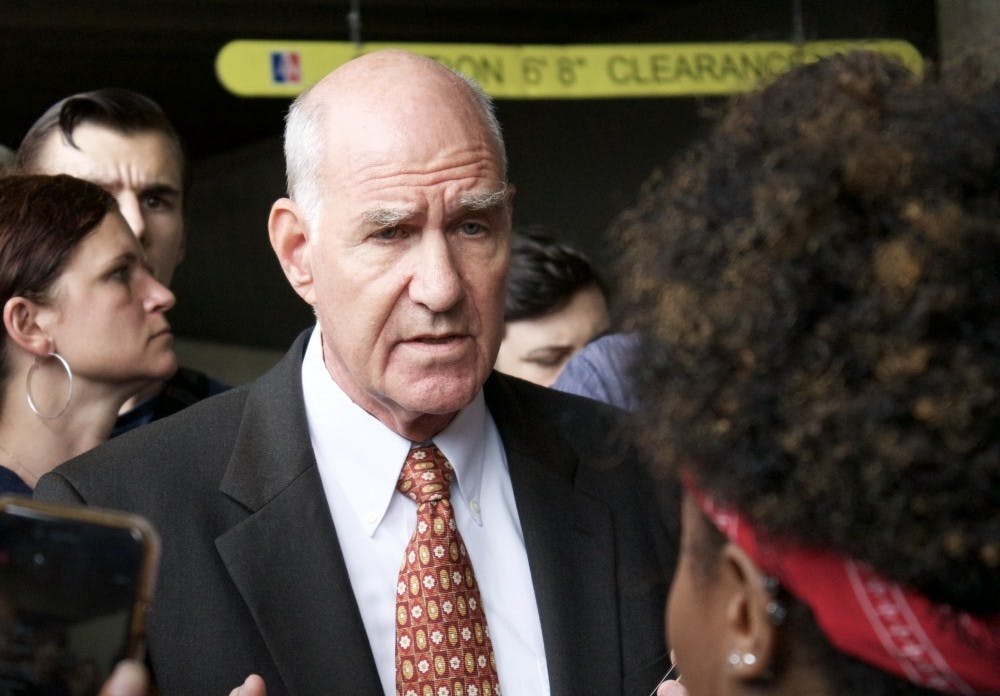As Provost Scott Bass prepares to step down after 10 years in his role, six women have accused him of discrimination in the tenure process. They’ve accused him of discriminating against them on the basis of sex, race and age.
As the University’s top academic administrator, Bass has considerable influence over whether a professor receives tenure. However, throughout the process, candidates receive feedback from faculty, both inside and outside of AU, and administrators before they are evaluated by the provost. In a few cases, support received from faculty and administrators throughout the tenure process is not matched by the provost at its end.
For example, Loubna Skalli-Hanna, a former professor in the School of International Service, told The Eagle she received positive evaluations and was recommended for tenure at every point in her process. However, Bass denied Skalli-Hanna tenure because she failed to complete a book. Additionally, he said articles she published during her time at AU “demonstrated a low likelihood that she would be a productive scholar in the future,” according to a court order.
Another example is the case of Carolyn Brown, a former professor in the School of Communication. In a mid-term evaluation of her, SOC Dean Jeff Rutenbeck expressed concern about Brown’s teaching evaluations and recommended she receive mentoring. When Brown applied for tenure and promotion in October 2016, she received positive evaluations, including a recommendation from SOC Dean Jeff Rutenbeck. However, she learned from Bass in March 2017 that she was denied tenure and promotion. He attributed the denial to her poor teaching evaluations.
On the other hand, there are professors who received the same answer from the provost and lower-level administrators. For example, Jennifer Diascro, a former professor in the School of Public Affairs, received warning signs before her application reached the provost. While she received four out of five positive external reviews, Diascro was denied reappointment by the Department of Government, the dean of SPA and Bass. All three cited the inadequacy of her research and her lack of continued productivity in her field.
Another example is Caren Goldberg, a former assistant professor in the Kogod School of Business. She applied for tenure in the fall of 2012 and was denied in May 2013. Goldberg claims she was denied tenure because of AU’s lack of respect for feminist research. Work published in the feminist journal, “Psychology of Women Quarterly,” was not recognized as “top tier” by the University. However, she was given several warnings during her six-year tenure review process to publish more research and improve her teaching performance, according to a court order. The former dean of the Kogod School of Business, Richard Durand, did not recommend her for reappointment in her fifth and sixth years of tenure review.
After reviewing these cases (in addition to two others presented in our original article), The Eagle questions the difference of opinion between those who evaluate the candidate at early phases of the tenure process and the provost. In the case of Skalli-Hanna and Brown, for example, why were they recommended for tenure at the initial phases in the process and then denied by the provost? Tenure denial can be devastating for our professors and derail their careers. Communication must improve between all of their evaluators so that professors are not pushed along in the process, only to be denied by the provost.
In a 2015 resolution, the Faculty Senate unanimously approved a resolution on freedom of expression. These tenure discrimination allegations seem to demonstrate that AU’s academic environment might not be the bastion of academic freedom that it declares itself to be. Is the University standing firm as a “place that is open to diverse ideas and free expression,” as the resolution states, when its top academic administrator faces allegations of discrimination?
As the University recruits its next provost, The Eagle would like the school to honor its commitment to “inclusive excellence,” the title of AU’s two-year diversity and inclusion strategy. The next provost will be responsible for filling empty dean positions, one of those being the School of International Service and the other the School of Professional and Extended Studies. These new deans, with the help of the provost and other stakeholders, will be responsible for recruiting and hiring our faculty members. Prospective faculty, including women and people of color, may not want to work at an institution tainted by discrimination allegations. The next provost must work to build trust between the faculty and the provost.
As students, we also want our current professors -- not just faculty that AU seeks to recruit -- to feel respected and represented in our community. This cannot be accomplished when allegations of discrimination cloud their work environment. They deserve a fair tenure process. If not, we must consider the example that AU is demonstrating for its own budding student-scholars and the higher education community. The next provost must work to repair this reputation and reform the environment that produced it.
-E




